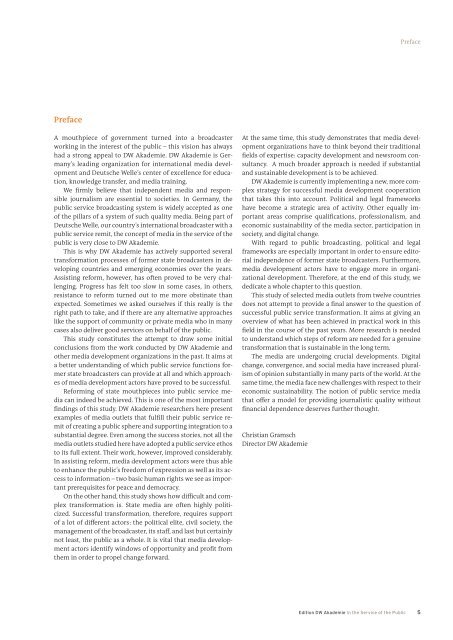edition-dw-akademie-in-the-service-of-the-public-functions-and-transformation-of-media-in-developing-countries-pdf
edition-dw-akademie-in-the-service-of-the-public-functions-and-transformation-of-media-in-developing-countries-pdf
edition-dw-akademie-in-the-service-of-the-public-functions-and-transformation-of-media-in-developing-countries-pdf
You also want an ePaper? Increase the reach of your titles
YUMPU automatically turns print PDFs into web optimized ePapers that Google loves.
PrefacePrefaceA mouthpiece <strong>of</strong> government turned <strong>in</strong>to a broadcasterwork<strong>in</strong>g <strong>in</strong> <strong>the</strong> <strong>in</strong>terest <strong>of</strong> <strong>the</strong> <strong>public</strong> – this vision has alwayshad a strong appeal to DW Akademie. DW Akademie is Germany’slead<strong>in</strong>g organization for <strong>in</strong>ternational <strong>media</strong> development<strong>and</strong> Deutsche Welle’s center <strong>of</strong> excellence for education,knowledge transfer, <strong>and</strong> <strong>media</strong> tra<strong>in</strong><strong>in</strong>g.We firmly believe that <strong>in</strong>dependent <strong>media</strong> <strong>and</strong> responsiblejournalism are essential to societies. In Germany, <strong>the</strong><strong>public</strong> <strong>service</strong> broadcast<strong>in</strong>g system is widely accepted as one<strong>of</strong> <strong>the</strong> pillars <strong>of</strong> a system <strong>of</strong> such quality <strong>media</strong>. Be<strong>in</strong>g part <strong>of</strong>Deutsche Welle, our country’s <strong>in</strong>ternational broadcaster with a<strong>public</strong> <strong>service</strong> remit, <strong>the</strong> concept <strong>of</strong> <strong>media</strong> <strong>in</strong> <strong>the</strong> <strong>service</strong> <strong>of</strong> <strong>the</strong><strong>public</strong> is very close to DW Akademie.This is why DW Akademie has actively supported several<strong>transformation</strong> processes <strong>of</strong> former state broadcasters <strong>in</strong> develop<strong>in</strong>g<strong>countries</strong> <strong>and</strong> emerg<strong>in</strong>g economies over <strong>the</strong> years.Assist<strong>in</strong>g reform, however, has <strong>of</strong>ten proved to be very challeng<strong>in</strong>g.Progress has felt too slow <strong>in</strong> some cases, <strong>in</strong> o<strong>the</strong>rs,resistance to reform turned out to me more obst<strong>in</strong>ate thanexpected. Sometimes we asked ourselves if this really is <strong>the</strong>right path to take, <strong>and</strong> if <strong>the</strong>re are any alternative approacheslike <strong>the</strong> support <strong>of</strong> community or private <strong>media</strong> who <strong>in</strong> manycases also deliver good <strong>service</strong>s on behalf <strong>of</strong> <strong>the</strong> <strong>public</strong>.This study constitutes <strong>the</strong> attempt to draw some <strong>in</strong>itialconclusions from <strong>the</strong> work conducted by DW Akademie <strong>and</strong>o<strong>the</strong>r <strong>media</strong> development organizations <strong>in</strong> <strong>the</strong> past. It aims ata better underst<strong>and</strong><strong>in</strong>g <strong>of</strong> which <strong>public</strong> <strong>service</strong> <strong>functions</strong> formerstate broadcasters can provide at all <strong>and</strong> which approaches<strong>of</strong> <strong>media</strong> development actors have proved to be successful.Reform<strong>in</strong>g <strong>of</strong> state mouthpieces <strong>in</strong>to <strong>public</strong> <strong>service</strong> <strong>media</strong>can <strong>in</strong>deed be achieved. This is one <strong>of</strong> <strong>the</strong> most importantf<strong>in</strong>d<strong>in</strong>gs <strong>of</strong> this study. DW Akademie researchers here presentexamples <strong>of</strong> <strong>media</strong> outlets that fulfill <strong>the</strong>ir <strong>public</strong> <strong>service</strong> remit<strong>of</strong> creat<strong>in</strong>g a <strong>public</strong> sphere <strong>and</strong> support<strong>in</strong>g <strong>in</strong>tegration to asubstantial degree. Even among <strong>the</strong> success stories, not all <strong>the</strong><strong>media</strong> outlets studied here have adopted a <strong>public</strong> <strong>service</strong> ethosto its full extent. Their work, however, improved considerably.In assist<strong>in</strong>g reform, <strong>media</strong> development actors were thus ableto enhance <strong>the</strong> <strong>public</strong>’s freedom <strong>of</strong> expression as well as its accessto <strong>in</strong>formation – two basic human rights we see as importantprerequisites for peace <strong>and</strong> democracy.On <strong>the</strong> o<strong>the</strong>r h<strong>and</strong>, this study shows how difficult <strong>and</strong> complex<strong>transformation</strong> is. State <strong>media</strong> are <strong>of</strong>ten highly politicized.Successful <strong>transformation</strong>, <strong>the</strong>refore, requires support<strong>of</strong> a lot <strong>of</strong> different actors: <strong>the</strong> political elite, civil society, <strong>the</strong>management <strong>of</strong> <strong>the</strong> broadcaster, its staff, <strong>and</strong> last but certa<strong>in</strong>lynot least, <strong>the</strong> <strong>public</strong> as a whole. It is vital that <strong>media</strong> developmentactors identify w<strong>in</strong>dows <strong>of</strong> opportunity <strong>and</strong> pr<strong>of</strong>it from<strong>the</strong>m <strong>in</strong> order to propel change forward.At <strong>the</strong> same time, this study demonstrates that <strong>media</strong> developmentorganizations have to th<strong>in</strong>k beyond <strong>the</strong>ir traditionalfields <strong>of</strong> expertise: capacity development <strong>and</strong> newsroom consultancy.A much broader approach is needed if substantial<strong>and</strong> susta<strong>in</strong>able development is to be achieved.DW Akademie is currently implement<strong>in</strong>g a new, more complexstrategy for successful <strong>media</strong> development cooperationthat takes this <strong>in</strong>to account. Political <strong>and</strong> legal frameworkshave become a strategic area <strong>of</strong> activity. O<strong>the</strong>r equally importantareas comprise qualifications, pr<strong>of</strong>essionalism, <strong>and</strong>economic susta<strong>in</strong>ability <strong>of</strong> <strong>the</strong> <strong>media</strong> sector, participation <strong>in</strong>society, <strong>and</strong> digital change.With regard to <strong>public</strong> broadcast<strong>in</strong>g, political <strong>and</strong> legalframeworks are especially important <strong>in</strong> order to ensure editorial<strong>in</strong>dependence <strong>of</strong> former state broadcasters. Fur<strong>the</strong>rmore,<strong>media</strong> development actors have to engage more <strong>in</strong> organizationaldevelopment. Therefore, at <strong>the</strong> end <strong>of</strong> this study, wededicate a whole chapter to this question.This study <strong>of</strong> selected <strong>media</strong> outlets from twelve <strong>countries</strong>does not attempt to provide a f<strong>in</strong>al answer to <strong>the</strong> question <strong>of</strong>successful <strong>public</strong> <strong>service</strong> <strong>transformation</strong>. It aims at giv<strong>in</strong>g anoverview <strong>of</strong> what has been achieved <strong>in</strong> practical work <strong>in</strong> thisfield <strong>in</strong> <strong>the</strong> course <strong>of</strong> <strong>the</strong> past years. More research is neededto underst<strong>and</strong> which steps <strong>of</strong> reform are needed for a genu<strong>in</strong>e<strong>transformation</strong> that is susta<strong>in</strong>able <strong>in</strong> <strong>the</strong> long term.The <strong>media</strong> are undergo<strong>in</strong>g crucial developments. Digitalchange, convergence, <strong>and</strong> social <strong>media</strong> have <strong>in</strong>creased pluralism<strong>of</strong> op<strong>in</strong>ion substantially <strong>in</strong> many parts <strong>of</strong> <strong>the</strong> world. At <strong>the</strong>same time, <strong>the</strong> <strong>media</strong> face new challenges with respect to <strong>the</strong>ireconomic susta<strong>in</strong>ability. The notion <strong>of</strong> <strong>public</strong> <strong>service</strong> <strong>media</strong>that <strong>of</strong>fer a model for provid<strong>in</strong>g journalistic quality withoutf<strong>in</strong>ancial dependence deserves fur<strong>the</strong>r thought.Christian GramschDirector DW AkademieEdition DW Akademie In <strong>the</strong> Service <strong>of</strong> <strong>the</strong> Public 5


